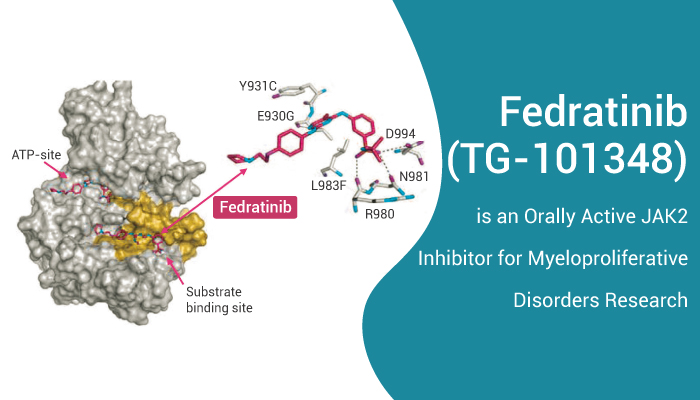Janus kinase (JAK) is a family of intracellular, nonreceptor tyrosine kinases that transduce cytokine-mediated signals via the JAK–STAT pathway. Since members of the type I and type II cytokine receptor families possess no catalytic kinase activity, they rely on the JAK family of tyrosine kinases to phosphorylate and activate downstream proteins involved in their signal transduction pathways. The receptors exist as paired polypeptides, thus exhibiting two intracellular signal-transducing domains. Furthermore, JAKs associate with a proline-rich region in each intracellular domain, which is adjacent to the cell membrane and called a box1/box2 region. In addition, after the receptor associates with its respective cytokine/ligand, it goes through a conformational change, bringing the two JAKs close enough to phosphorylate each other. Moreover, the JAK autophosphorylation induces a conformational change within itself, enabling it to transduce the intracellular signal by further phosphorylating and activating transcription factors called STATs.

Fedratinib (also known as TG-101348) is a potent, selective, ATP-competitive and orally active JAK2 inhibitor.
Meanwhile, Fedratinib inhibits both JAK2 and JAK2V617F kinase. Fedratinib shows 35- and 334-fold selectivity for JAK2 over JAK1 and JAK3, respectively. In addition, Fedratinib inhibits proliferation of a human erythroblast leukemia (HEL) cell line that harbors the JAK2V617F mutation, as well as a murine pro-B cell line expressing human JAK2V617F (Ba/F3 JAK2V617F). Moreover, Fedratinib reduces STAT5 phosphorylation in these cells. Besides, Fedratinib induces apoptosis in both HEL and Ba/F3 JAK2V617F cells in a dose-dependent manner. In contrast, Fedratinib shows no activity against normal human dermal fibroblasts.
Fedratinib has the potential for myeloproliferative disorders research. Specifically, Fedratinib shows therapeutic efficacy in a murine model of myeloproliferative disease induced by the JAK2V617F mutation. In treated animals, Fedratinib significant reduces hematocrit and leukocyte count, eliminates extramedullary hematopoiesis. There are no apparent toxicities and no effect on T cell number.
To sum up, Fedratinib is a potent, selective, ATP-competitive and orally active JAK2 inhibitor.
References:
[1] Wernig G, et al. Cancer Cell. 2008 Apr;13(4):311-20.